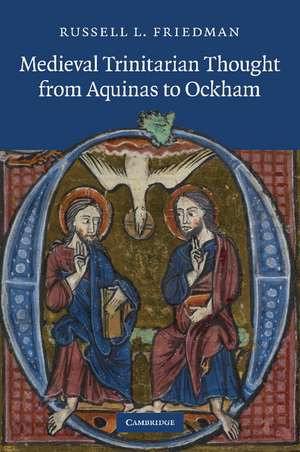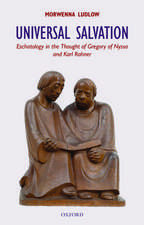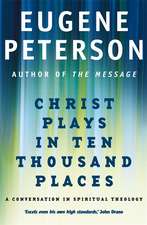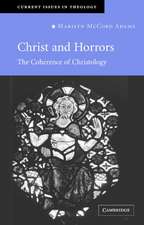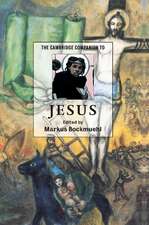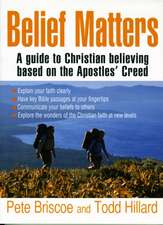Medieval Trinitarian Thought from Aquinas to Ockham
Autor Russell L. Friedmanen Limba Engleză Paperback – 21 aug 2013
| Toate formatele și edițiile | Preț | Express |
|---|---|---|
| Paperback (1) | 309.94 lei 3-5 săpt. | +17.28 lei 7-11 zile |
| Cambridge University Press – 21 aug 2013 | 309.94 lei 3-5 săpt. | +17.28 lei 7-11 zile |
| Hardback (1) | 692.50 lei 6-8 săpt. | |
| Cambridge University Press – 20 ian 2010 | 692.50 lei 6-8 săpt. |
Preț: 309.94 lei
Nou
Puncte Express: 465
Preț estimativ în valută:
59.31€ • 62.13$ • 49.15£
59.31€ • 62.13$ • 49.15£
Carte disponibilă
Livrare economică 18 martie-01 aprilie
Livrare express 04-08 martie pentru 27.27 lei
Preluare comenzi: 021 569.72.76
Specificații
ISBN-13: 9781107685451
ISBN-10: 1107685451
Pagini: 208
Ilustrații: black & white illustrations
Dimensiuni: 152 x 229 x 12 mm
Greutate: 0.31 kg
Editura: Cambridge University Press
Colecția Cambridge University Press
Locul publicării:New York, United States
ISBN-10: 1107685451
Pagini: 208
Ilustrații: black & white illustrations
Dimensiuni: 152 x 229 x 12 mm
Greutate: 0.31 kg
Editura: Cambridge University Press
Colecția Cambridge University Press
Locul publicării:New York, United States
Cuprins
Acknowledgements; Introduction; 1. The Trinity and the Aristotelian categories: different ways of explaining identity and distinction; 2. The Trinity and human psychology: 'In the Beginning Was the Word'; 3. The Trinity and metaphysics: the formal distinction, divine simplicity, and the psychological model; 4. The Trinity, divine simplicity, and fideism - or: was Gilson right about the fourteenth century after all?; Appendix. Major elements in Franciscan and Dominican Trinitarian theologies; Bibliography of primary sources; Annotated bibliography of selected secondary literature; Index.
Recenzii
Review of the hardback: 'This brilliant book uncovers a key phase in the history of Trinitarian doctrine, from ca. 1250 to 1350. It discusses a number of thinkers whose works have remained largely unknown outside of a small group of specialists, and in doing so dispels the view that there was no significant Trinitarian development after Bonaventure, Aquinas and Duns Scotus. Friedman combines outstanding scholarly knowledge of primary texts with utmost readability, revealing the extraordinary diversity, coherence, and vitality of later-medieval theology of the Trinity. This book is a marvellous achievement, and essential reading for anybody who has an interest in Trinitarian theology.' Rik Van Nieuwenhove, University of Limerick
Review of the hardback: 'With his clear presentation of background philosophical categories and his selection of texts from well-known and, happily, not so well-known theologians, Friedman has achieved a three-fold project … To have achieved each of these projects in so short a volume reveals the author's acumen and expertise. To have done so in such a readable style reveals his pedagogical gifts. The volume is suitable for advanced undergraduate and graduate students. Complete with a helpful appendix, bibliographies … and index.' Mary-Beth Ingham, Heythrop Journal
Review of the hardback: 'In this highly specialized yet decidedly accessible work, Friedman … provides an overview of Trinitarian thought in the Latin West during the thirteenth and fourteenth centuries … For those interested in learning about or deepening their understanding of later-medieval Trinitarian thought, this is a crucial resource … Summing up: essential. [4 stars].' F. A. Grabowski, Choice
Review of the hardback: 'Russell Friedman has succeeded in writing a book on an abstruse area of medieval scholastic theology that is at once sophisticated and user-friendly … [He] does the introductory reader to the field a double service in creating an extremely readable account and in introducing one to an incredible spectrum of opinions on Trinitarian theology during the thirteenth and fourteenth centuries.' Jonathan Warren, Reviews in Religion and Theology
Review of the hardback: 'It is hardly possible to imagine a book that could better lead its reader to the very heart of medieval culture than Russell Friedman's study … The book is a perfect starting point for any reader interested in how medieval theologians coped with the most difficult conceptual problems, using not only theological but also metaphysical, logical, and psychological analyses.' Pekka Kärkkäinen, Speculum
'… a welcome addition to academic discourse exploring medieval theologians' understanding … clear and concise when dealing with complex ideas and intricate arguments … includes an appendix … The book delivers a detailed exposition of the different ways the two schools of thought approach the construction of the doctrine of the Trinity and the roles which 'the psychological model', 'opposed relation' and the interplay of faith and reason have in the development of these constructions … the reader is provided with a detailed analysis of these different 'takes' on Trinitarian doctrine.' Paul M. Collins, Scottish Bulletin of Evangelical Theology
Review of the hardback: 'With his clear presentation of background philosophical categories and his selection of texts from well-known and, happily, not so well-known theologians, Friedman has achieved a three-fold project … To have achieved each of these projects in so short a volume reveals the author's acumen and expertise. To have done so in such a readable style reveals his pedagogical gifts. The volume is suitable for advanced undergraduate and graduate students. Complete with a helpful appendix, bibliographies … and index.' Mary-Beth Ingham, Heythrop Journal
Review of the hardback: 'In this highly specialized yet decidedly accessible work, Friedman … provides an overview of Trinitarian thought in the Latin West during the thirteenth and fourteenth centuries … For those interested in learning about or deepening their understanding of later-medieval Trinitarian thought, this is a crucial resource … Summing up: essential. [4 stars].' F. A. Grabowski, Choice
Review of the hardback: 'Russell Friedman has succeeded in writing a book on an abstruse area of medieval scholastic theology that is at once sophisticated and user-friendly … [He] does the introductory reader to the field a double service in creating an extremely readable account and in introducing one to an incredible spectrum of opinions on Trinitarian theology during the thirteenth and fourteenth centuries.' Jonathan Warren, Reviews in Religion and Theology
Review of the hardback: 'It is hardly possible to imagine a book that could better lead its reader to the very heart of medieval culture than Russell Friedman's study … The book is a perfect starting point for any reader interested in how medieval theologians coped with the most difficult conceptual problems, using not only theological but also metaphysical, logical, and psychological analyses.' Pekka Kärkkäinen, Speculum
'… a welcome addition to academic discourse exploring medieval theologians' understanding … clear and concise when dealing with complex ideas and intricate arguments … includes an appendix … The book delivers a detailed exposition of the different ways the two schools of thought approach the construction of the doctrine of the Trinity and the roles which 'the psychological model', 'opposed relation' and the interplay of faith and reason have in the development of these constructions … the reader is provided with a detailed analysis of these different 'takes' on Trinitarian doctrine.' Paul M. Collins, Scottish Bulletin of Evangelical Theology
Notă biografică
Descriere
A survey of the scholastic debate on the divine Trinity in the period between Aquinas' earliest works and Ockham's death.
